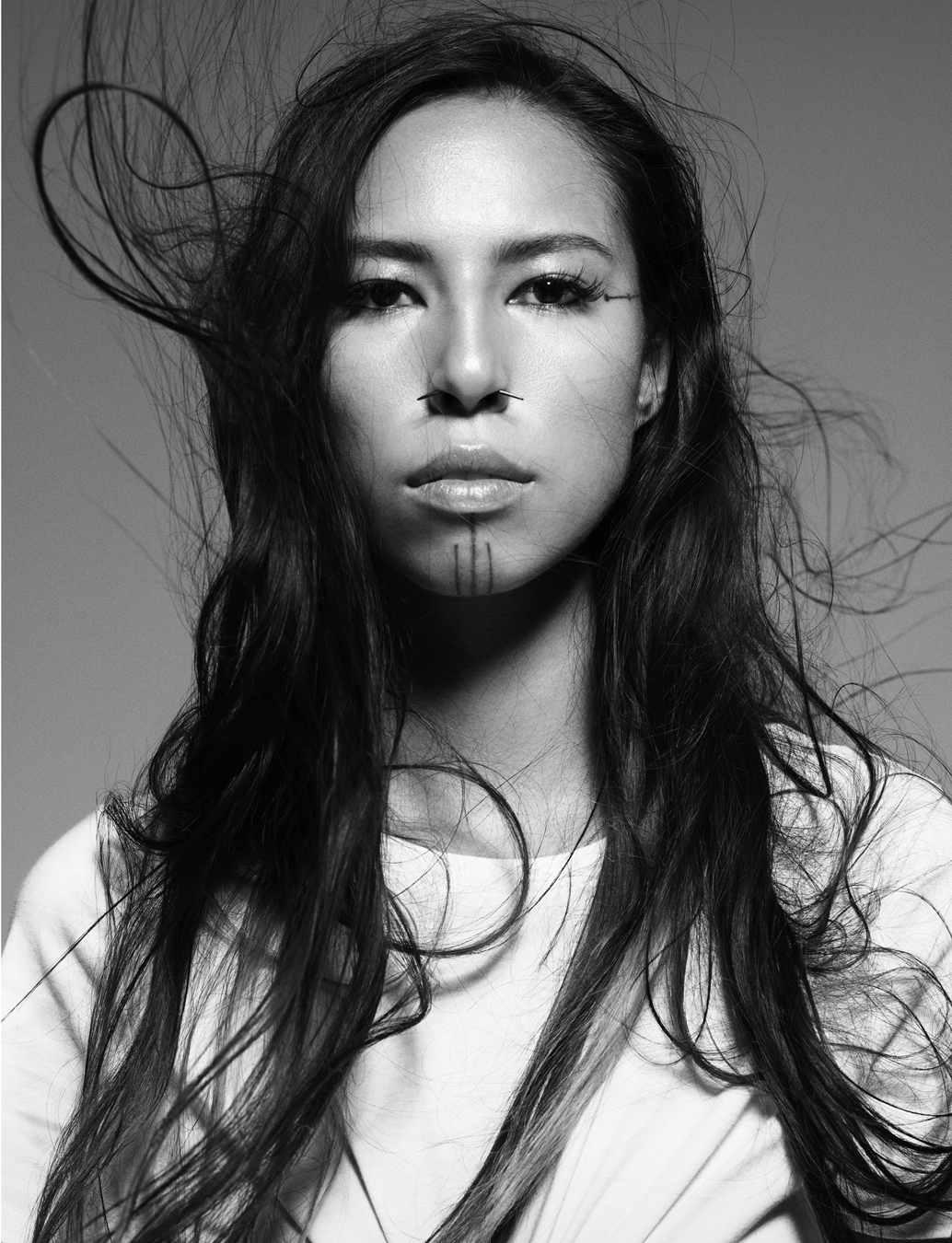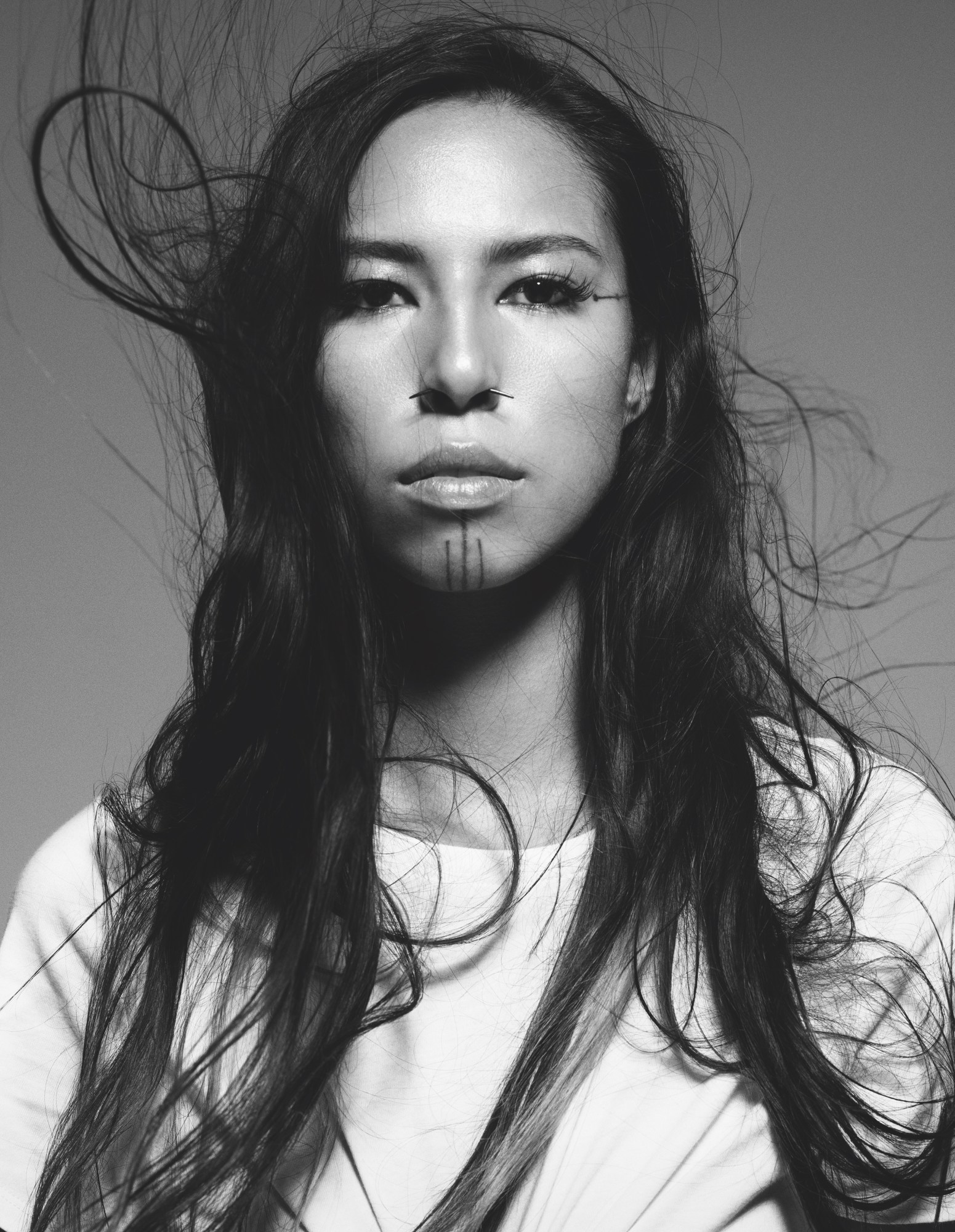This story originally appeared in i-D’s The Earthrise Issue, no. 368, Summer 2022. Order your copy here.
Stood proud in a pyramidal tulle gown and with two eagle feathers in her hair, Quannah Chasinghorse’s appearance at the 2022 Met Gala proved why she has become one of the most emblematic models of her generation. The reason is as much to do with what she stands for as how she looks. At twenty years old, the Oglala Lakota and Han Gwich’in model has used the Chanel runways she’s walked and the magazine covers she’s starred on as platforms to draw attention to the existential threats that her people face – whether from government-backed oil prospectors looking to drill on Indigenous occupied lands in the USA, or the rapidly-worsening climate crisis.
For her feature in this issue, we could think of no one better for her to be in conversation with than Xiye Bastida, the Mexican-Chilean climate activist and member of the Indigenous Mexican Otomi-Toltec nation. Currently based in New York City, having moved there in 2015 after severe flooding hit her hometown in Southern Mexico. The twenty-year-old made a name in activist circles as a leading organiser of NYC’s Fridays For Future chapter, the weekly school strike movement initially sparked by Greta Thunberg, and as a campaigner for an intersectional approach to climate justice.
Here, the two young trailblazers speak frankly about their relationships to their activism practices, their qualms about working with brands, and the importance of self-care.

Xiye: A CEO was recently talking to me about becoming “green” so customers would trust his brand. But I often feel that, even if we don’t want to be, we are used for “green” branding. Working in fashion, do you ever get the sense that you’re being used for those sorts of purposes?
Quannah: As activists we fear that we’re being used to improve a brand’s image, and that they are using our voices for their own benefit. A lot of people want blank canvases. They want girls they can just do whatever on. But you can’t try to erase the Indigeneity that I fought so hard to represent, and that includes my tattoos. It’s about putting up my culture, and switching my peoples’ generation on. Indigenous people have been misrepresented in the media. It’s hard to navigate.
Xiye: As Indigenous people, even when we go to climate conferences we know we’re gonna get a hard time, and probably won’t even be given space to talk. We show up and they still don’t care.
Quannah: Exactly. And we have to make sacrifices to be there. It’s been really hard accepting that I can’t go back home to class anymore, and that I need to be working. I need to be in all these places breaking barriers and establishing that there are standards when you work with Indigenous people. Every time I walk onto a shoot, there’s always something, whether it’s an ignorant question or… you know what I mean? It’s draining, but it is what it is, and it’s so important that our experiences are seen not just as those of advocates, but of real people.
Xiye: How do you make sure that you take care of yourself?
Quannah: It can be hard. There are times when I feel like I’m losing my sense of identity, and that scares me. There are moments when I feel a little like I’m not being seen the way I should be seen. But I try to stay grounded, often by constantly calling my mom, and my aunties. It reminds me of our values, of the things they’ve always known.
Xiye: People in our community need to slow down and feel connected to each other.
Quannah: That’s a thing I’ve actually had to do myself: to take those moments to sit down and process, to feel what I need to feel. That’s something I’ve had a hard time with this year, so much has happened that I haven’t given myself enough space.
Xiye: We need to be thinking of ourselves; we need to take time to process things.
Quannah: When I started working, I didn’t want to do any collaborations with brands. What made me change my mind was the fact that some brands were willing to take the steps needed. I was talking to them about my advocacy, and it was clear that they were committed to all of these things.
Xiye: We can’t shut everybody out. If there’s a door open, we have to keep it open. It’s not about always saying no. That response is for people and industries that can’t change, or have shown they aren’t willing to. That’s also been my struggle – thinking about how I can engage in spaces in a way that inspires people to actually care.
Quannah: Yeah, and you can talk all you want, but it’s about walking the walk.
Xiye: Today, actually, I went to a conference where a representative from a big cosmetics company – which once asked me to collaborate with them in Mexico – was talking. When they first approached me, they weren’t sustainable, and over the years I’ve seen them publicly change, and now they have plans to be fully plastic-free. I was so surprised.
Quannah: It’s hard for people to believe that brands are willing to be sustainable – I’d never have expected that from a global cosmetics company. But now, young people like us are entering those spaces, and we’re sharing our perspectives.
Xiye: It’s about storytelling and tapping into the human experience.
Quannah: It’s not just about asking: What’s good for the business? Because, at the end of the day, people are so done with this bullshit culture of consumerism.
Xiye: People often ask me, “How do you stay in the movement? What keeps you hopeful?” And for me, it’s not really about “what keeps me hopeful”…
Quannah: Sometimes you’re like, “fuck”.
Xiye: Yeah! For me, it’s about instinct, and knowing that we are working for something greater together.
Quannah: For me, it’s honestly people like you, our generation, we have so much to say about the same things but we all have our own experiences, too. I see that people really do want to learn. It’s not my job to be their teacher, but I’m put in a position where I really have no other choice but to plant that seed and do some of the work for them… I think that if I can get people to go home and start tweaking things on a small scale, it’s not exactly what’s gonna make the biggest difference, but it’s something, you know?
Xiye: You’ve probably heard people say things like, “Oh, you’re so inspiring! You kids are gonna change the world,” so many times. But my response to all the people who say that is that they have the ability to do that, too.
Quannah: Exactly.
Follow i-D on Instagram and TikTok for more from the new issue.
Credits
Introduction Mahoro Seward
Photography Mario Sorrenti
Hair Bob Recine
Make up Aaron de Mey at Art Partner
Lighting technician Lars Beaulieu
Photography assistance Kotaro Kawashima and Javier Villegas
Digital technician Chad Meyer
Production Katie Fash, Layla Néméjanski and Steve Sutton
Production assistance William Cipos
All clothing model’s own


